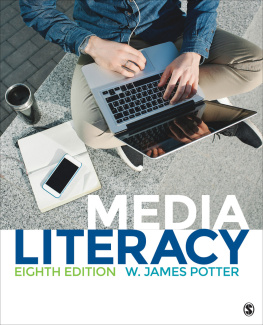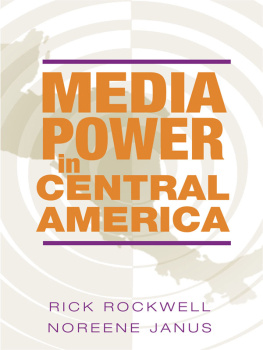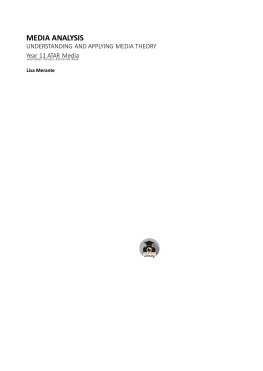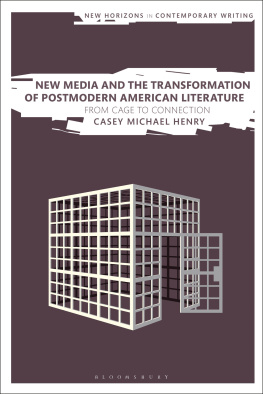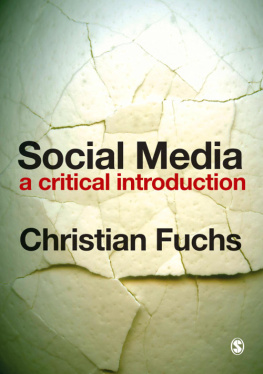Convergence Culture
Henry Jenkins
Convergence Culture
Where Old and New Media Collide

NEW YORK UNIVERSITY PRESS
New York and London
www.nyupress.org
2006 by New York University
All rights reserved
Library of Congress Cataloging-in-Publication Data
Jenkins, Henry, 1958
Convergence culture : where old and new media collide / Henry Jenkins.
p. cm.
Includes bibliographical references and index.
ISBN-13: 978-0-8147-4281-5 (cloth : alk. paper)
ISBN-10: 0-8147-4281-5 (cloth : alk. paper)
1. Mass media and cultureUnited States. 2. Popular cultureUnited States.
I. Title.
P94.65.U6J46 2006
302.230973dc22 2006007358
New York University Press books are printed on acid-free paper,
and their binding materials are chosen for strength and durability.
Manufactured in the United States of America
c 10 9 8 7 6 5 4 3 2 1
p 10 9 8 7 6 5 4 3 2 1
Contents
Acknowledgments
Writing this book has been an epic journey, helped along by many hands. Convergence Culture is in many ways the culmination of the past eight years of my life, an outgrowth of my efforts to build up MITs Comparative Media Studies program as a center for conversations about media change (past, present, and future) and of my efforts to enlarge public dialogues about popular culture and contemporary life. A fuller account of how this book emerged from the concerns of Textual Poachers: Television Fans and Participatory Culture (New York: Routledge, 1991) and was shaped by my intellectual growth over the past decade can be found in the introduction to my anthology Fans, Gamers, and Bloggers: Exploring Participatory Culture (New York: New York University Press, 2006).
Given that history, it is perhaps appropriate that my first set of thanks goes to the students of the Comparative Media Studies program. Each and every one of them has had an impact on my thinking, but I want especially to identify students whose work significantly influenced the content of this book: Ivan Askwith, R. J. Bain, Christian Baekkelund, Vanessa Bertozzi, Lisa Bidlingmeyer, Brett Camper, Anita Chan, Cristobal Garcia, Robin Hauck, Sean Leonard, Zhan Li, Geoffrey Long, Susannah Mandel, Andrea McCarty, Parmesh Shahani, Sangita Shresthova, Karen Lori Schrier, David Spitz, Philip Tan, Ilya Vedrashko, Margaret Weigel, and Matthew Weise. You are what gets me up in the morning and keeps me working late into the night. In particular, I want to thank Aswin Punathambekar, who was the best possible research assistant on this project, not only digging up resources but challenging my assumptions, and continuing to remain dedicated to the project long after he had left MIT to begin his doctoral work at the University of WisconsinMadison.
I also want to thank the members of the Comparative Media Studies staff who supported these efforts in countless ways: R. J. Bain, Jason Bentsman, Chris Pomiecko, Brian Theisen, and especially Susan Stapleton, whose cheerful disposition and calm resourcefulness always prevented impending disaster, and who supervised the proofing and fact checking of this project.
I also want to give a shout out to Philip S. Khoury, Kenan Sahin Dean, School of Humanities, Arts, and Social Sciences at MIT, who has always been in my corner as we have struggled to make this program fly and who gave me time off to pursue this project. My research has also been supported through the three chairs the dean has provided me: the Ann Fetter Friedlaender chair, the John E. Burchard chair, and the Peter de Florez chair.
This book emerged from many, many conversations with Alex Chisholm on long drives, early morning waits at airports, and meetings with potential sponsors. While Alex was not always patient with my foolishness, he vetted and refined almost every concept in this book; he taught this humanist how to speak the language of business and, through this process, how to become a better analyst and critic of contemporary media trends. I am also deeply indebted to Christopher Weaver, who co-taught our Popular Culture in the Age of Media Convergence seminar with me on multiple occasions, bringing our students (and myself) into direct contact with leading figures in the media industry and sharing frontline experiences that complemented and complicated my theoretical perspectives. I would also like to single out Kurt Squire, my faithful squire and sometimes writing collaborator, who has helped me to appreciate what games can teach us about the current state of our culture. Finally, I should acknowledge all of those who participated in the joint Initiative Media/Comparative Media Studies research project on American Idol that forms the basis for of this book: in particular, Alex Chisholm, Stephanie Davenport, David Ernst, Stacey Lynn Koerner, Sangita Shresthova, and Brian Theisen.
I was blessed to be able to have the readers and editors of Technology Review as another sounding board for my ideas as they took shape. In particular, I want to thank the fine folks who have edited my Digital Renaissance column through the years: Herb Brody, Kevin Hogan, Brad King, and Rebecca Zacks. I also want to sing the praises of David Thorburn, Brad Seawell, and the MIT Communications Forum. For several decades, the Communications Forum has brought leading media figures to campus, providing the right context for exploring ideas about where our media is going and how it is impacting public life.
Early conceptualizations of this book passed before two literary agents, Elyse Cheney and Carol Mann, who hoped to make me into a commercial nonfiction writer. They were sufficiently frank and discouraging enough to send me running back to the world of the university press, but in the process, they taught me some new tricks that, I hope, have made this book much more readable. Maybe someday
I am grateful for the many people who were willing to be interviewed for the book or who helped me to get in touch with key people I needed to interview: Sweeney Agonistes, Chris Albrecht, Marcia Allas, Mike Alessi, Danny Bilson, Kurt Busiek, ChillOne, Louise Craven, Mary Dana, Dennis Dauter, B. K. DeLong, David Ernst, Jonathon Fanton, Keith Fer-razzi, Claire Field, Chris Finan, Flourish, Carl Goodman, Denis Haack, Hugh Hancock, Bennett Haselton, J. Kristopher Huddy, Stacey Lynn Koerner, Raph Koster, David Kung, Garrett Laporto, Mario Lanza, Heather Lawver, Paul Levitz, John Love, Megan Morrison, Diane Nelson, Shawn Nelson, Dennis ONeil, Chris Pike, David Raines, Rick Rowley, Eduardo Sanchez, Sande Scoredos, Warren Spector, Patrick Stein, Linda Stone, Heidi Tandy, Joe Trippi, Steve Wax, Nancy Willard, Will Wright, Neil Young, and Zsenya.
I also want to thank a host of friends and intellectual colleagues who offered me just-in-time advice and encouragement: Harvey Ardman, Hal Abelson, Robert C. Allen, Todd Allen, Reid Ashe, W. James Au, Rebecca Black, Andrew Blau, Gerry Bloustein, David Bordwell, danah boyd, Amy Bruckman, Will Brooker, David Buckingham, Scott Bukat-man, John Campbell, Justine Cassell, Edward Castranova, Josh Cohen, Ian Condry, Ron Crane, Jon Cropper, Sharon Cumberland, Marc Davis, Thomas DeFrantz, Mark Dery, Mark Deuze, Kimberly DeVries, Julian Dibbell, Peter Donaldson, Tracy Fullerton, Simson L. Garfinkel, James Gee, Lisa Gitelman, Wendy Gordon, Nick Hahn, Mary Beth Haralovich, John Hartley, Heather Hendershott, Matt Hills, Mimi Ito, Mark Jancovich, Steven Johnson, Sara Gwenllian Jones, Gerard Jones, Louise Kennedy, Christina Klein, Eric Klopfer, Robert Kozinets, Ellen Kushner, Christopher Ireland, Jessica Irish, Kurt Lancaster, Brenda Laurel, Chap Lawson, Geoffrey Long, Peter Ludlow, Davis Maston, Frans Mayra, Robert Metcalfe, Scott McCloud, Grant McCracken, Jane McGonigal, Edward McNally, Tara McPherson, Jason Mittell, Janet Murray, Susan J. Napier, Angela Ndlianis, Annalee Newitz, Tasha Oren, Ciela Pearce, Steven Pinker, Warren Sack, Katie Salens, Nick Sammond, Kevin San-dler, Greg Shaw, Greg Smith, Janet Sonenberg, Constance Steinkuehler, Mary Stuckey, David Surman, Steven J. Tepper, Doug Thomas, Clive Thompson, Sherry Turkle, Fred Turner, William Uricchio, Shenja van der Graaf, Jesse Walker, Jing Wang, Yuichi Washida, David Weinberger, Pam Wilson, Femke Wolting, Chris Wright, and Eric Zimmerman. I should note that the separation between this list and the previous one was relatively arbitrary since many in the first list are also friends and offered advice and encouragement.
Next page

